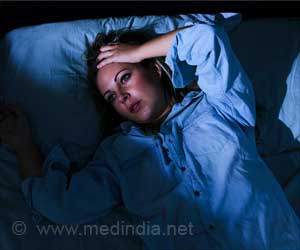Sleep deprivation can make a person more socially isolated and induce a sense of loneliness, says study.
- Sleep-deprived individuals don’t feel like connecting with others and end up feeling lonelier
- Others find sleep-deprived people less socially attractive and start feeling lonely just after a brief encounter with them, although they are well-rested themselves
- Poor sleep can thus trigger a viral contagion of social isolation
"We humans are a social species. Yet sleep deprivation can turn us into social lepers," said study senior author Matthew Walker, a UC Berkeley professor of psychology and neuroscience. "The less sleep you get, the less you want to socially interact. In turn, other people perceive you as more socially repulsive, further increasing the grave social-isolation impact of sleep loss," Walker added. "That vicious cycle may be a significant contributing factor to the public health crisis that is loneliness."
Nearly half of Americans have reported feeling lonely or left out. Moreover, loneliness increases a person’s risk of mortality (death risk) by more than 45 percent; this figure is double the mortality risk associated with obesity.
"It's perhaps no coincidence that the past few decades have seen a marked increase in loneliness and an equally dramatic decrease in sleep duration," said study lead author Eti Ben Simon, a postdoctoral fellow in Walker's Center for Human Sleep Science at UC Berkeley. "Without sufficient sleep we become a social turn-off, and loneliness soon kicks in."
Sleep Study
Walker and Ben Simon conducted a series of intricate experiments using various tools to gauge the social effects of poor sleep:Videotaped Simulations: First, they tested the social and neural responses of 18 healthy young adults after they had a normal night's sleep and a sleepless night using videotaped simulations that showed them clips of individuals with neutral expressions walking toward them. The participants pushed a button to stop the video when they thought the person on the video got too close. The button recorded how close they allowed the person to get.
fMRI brain imaging: The participants’ brains were scanned as they watched video clips of individuals walking towards them. The scans showed a heightened activity of social repulsion in a neural circuit known as the "near space network," in the sleep-deprived brains. This area is usually activated when the brain perceives potential incoming human threats or when they feel their personal space is being invaded.
Amazon's Mechanical Turk online marketplace: In this section of the study, more than 1,000 observers were recruited from the marketplace and shown videotapes of study participants discussing commonplace opinions and activities.
The observers rated each of the subjects based on how lonely they appeared, and whether they would be willing to interact socially with them – all this was done in an unbiased manner as the observers did not know that the subjects had been deprived of sleep.
Their analysis revealed that the study participants were lonely and less socially desirable, each and every time.
When the observers were asked to rate their own levels of loneliness after watching videos of study participants, the answers they got were surprising – otherwise, healthy observers felt lonely after viewing just a 60-second clip of an alienated person. This proved that sleep-loss-induced alienation is contagious.
Standardized loneliness measures: Finally, the researchers studied whether just one night of good or bad sleep could influence a person’s sense of loneliness the next day. They used a standardized survey to track each person's state of loneliness. Questions like "How often do you feel isolated from others?" and "Do you feel you don't have anyone to talk to?" were asked in the survey.
The amounts of sleep a person got from one night to the next clearly predicted how lonely and unsociable they felt from one day to the next day.
Walker who is also the author of the bestseller, Why We Sleep, says humans are naturally programmed to nurture socially vulnerable members of their tribe to make their species survive; but, this protective instinct is missing when they are sleep-deprived. Conditions like starvation have a biological or a safety net which is lacking in sleep deprivation. Hence, when we lose just one or two hours of sleep, our physical and mental health implodes very quickly.
"On a positive note, just one night of good sleep makes you feel more outgoing and socially confident, and furthermore, will attract others to you." Walker said.
Reference:
- Eti Ben Simon, Matthew P. Walker. Sleep loss causes social withdrawal and loneliness. Nature Communications, 2018; 9 (1) DOI: 10.1038/s41467-018-05377-0
Source-Medindia
















